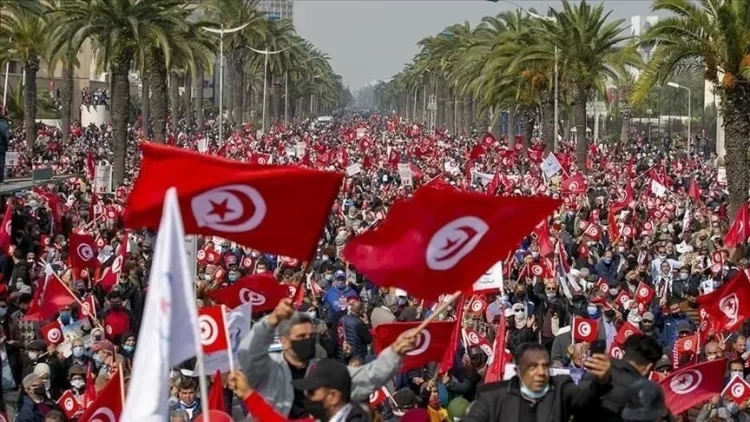Some coups and power grab start with the arrest of the leader of the political opposition. In Tunisia, it took almost two years for President Kais Saied to jail Rached Ghannouchi, the longtime president of Ennahda party and former parliamentary speaker. Since July 2021, when Saied arrogated to himself emergency powers, suspended parliament, and began ruling by decree, his assault on human rights has been a steady drip, drip rather than a massive show of force on day one.
When Saied had Ghannouchi arrested on April 18 on flimsy charges of inciting violence, it was not only to eliminate a political foe. Faced with growing unease at his inability to improve Tunisia’s ailing economy, Saied was stoking his supporters’ antipathy toward Ennahda, both among those who blame the party for its record while in government and those who dislike the party in principle because they suspect it of harboring an extremist Islamist agenda despite its professed adherence to democracy and pluralism.
Ghannouchi has been the lightning rod for these two lines of criticism. But he is only one of approximately a dozen current and former Ennahda figures jailed since December on politically motivated charges, along with several critics of Saied from other political movements.
After Ghannouchi, the best-known of the jailed Ennahda figures is Ali Laarayedh. The 67-year-old former interior and prime minister seems to be Exhibit (A) in Saied’s effort to shore up his base by demonizing those who preceded him in governing the country.
Ghannouchi has not known prison since the 1980s, having fled into exile for more than two decades before returning to Tunisia in early 2011. By contrast, Laarayedh’s relation with Tunisian prisons has a long pedigree, one that tells the story of the ups and—mainly—the downs of human rights in Tunisia, from a police state to the Arab Spring’s relative success story to the current slide back into autocracy.
Born months before his country became independent in 1956, Laarayedh has served prison time under three presidents. Each time, the charges have been political and based on flimsy or dubious evidence.
In 1981, Laarayedh—a maritime engineer by training—founded with Ghannouchi and others the Islamic Tendency Movement (MTI), an unrecognized political party. Laarayedh was among 90 MTI members tried by State Security Court in 1987 for sedition. Two of his co-defendants who, like Laarayedh, got the death penalty were promptly executed, prompting fears of a backlash against Tunisia’s first president, Habib Bourguiba, who had ruled with an iron fist for three decades.
Partly in response, in November 1987, Interior Minister Zine el-Abidine Ben Ali staged a “medical coup” against 84-year-old Bourguiba and promptly commuted the death sentences against Laarayedh and his co-defendants, before pardoning them in 1988 and 1989.
Ben Ali’s tolerance of the country’s leading Islamist movement, which changed its name from the MTI to Ennahda (Renaissance), proved short-lived. Following scattered incidents of Islamist violence, Ben Ali outlawed the group and began rounding up hundreds, mostly on charges of membership in an illegal organization and other nonviolent offenses. Laarayedh, as the movement’s spokesperson, was detained more than once before military courts convicted him and 264 co-defendants in 1992 in a pair of mass trials—tainted by coerced confessions and due-process violations—on charges of plotting to overthrow the state. Of those co-defendants, 46 men were sentenced to life terms.
Laarayedh got 15 years and ended up serving 14. Among the thousands of party members who filled Ben Ali’s prisons, Laarayedh served the most time in solitary confinement, spending more than 11 years in isolation across seven prisons.
Under Saied, a number of Ennahda leaders have been jailed. These include Noureddine Bhiri, detained in December 2021 on accusations that when he was a government minister between 2011 and 2013, he facilitated travel documents for Tunisians to join the Islamic State and other armed groups fighting in Syria, Iraq, and elsewhere. At the time, young Tunisians were leaving by the thousands to join the group. The authorities released Bhiri two months later without charging him, only to rearrest him in February 2023; he has yet to be charged.
Ghannouchi, since his arrest for incitement, has been shuttled from prison to an anti-terrorism unit of the National Guard for questioning. The day after his arrest, authorities closed the national headquarters of Ennahda and banned its members from holding meetings, bringing the country one step closer to the Ben Ali era, when the party was formally banned, and thousands were sent to prison merely for the “crime” of membership.



